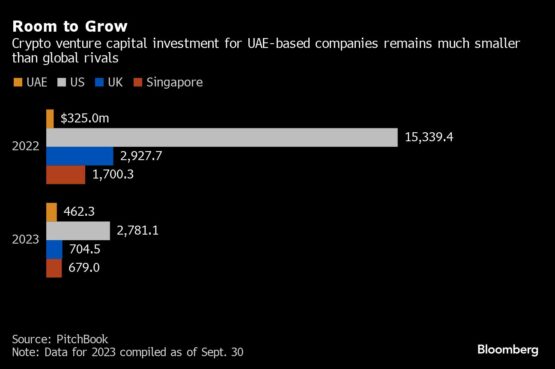Abu Dhabi is becoming a popular destination for crypto companies seeking eager investors and friendlier regulators, at a time when major markets like the US are experiencing an absence of both.
Companies like Copper Technologies, Paxos Trust Co and eToro Group have turned to Abu Dhabi as a destination for global expansion in recent weeks, securing licenses or establishing parts of their crypto businesses inside the emirate’s international economic zone, known as the Abu Dhabi Global Market. Shares in Phoenix Group, a cryptocurrency mining hardware company, have jumped 47% since their debut on public markets in Abu Dhabi on December 5.
ADVERTISEMENT
CONTINUE READING BELOW
Executives cite a growing network of partners and developing government policy as advantages to basing themselves in the city, in addition to deep-pocketed investors. While neighbouring Dubai became a popular choice when it established a crypto-specific watchdog called the Virtual Assets Regulatory Authority, or VARA, in March last year, officials in Abu Dhabi have been making a concerted play for the young industry’s attention, executives said.
“The buy-in generally for blockchain-based financial markets as the future for Abu Dhabi is very high,” said Copper Chief Executive Officer Dmitry Tokarev in an interview. ADGM’s Financial Services Regulatory Authority, the zone’s finance regulator, has listed support for innovation in digital assets as part of its 2024 business plan, Tokarev added.
The UK-headquartered crypto custodian debuted a new unit offering tokenised securities in Abu Dhabi last month, with officials from ADGM and sovereign wealth fund Mubadala giving speeches at an event in late November to mark the occasion. ADGM and Mubadala didn’t respond to requests for comment.
To some crypto firms, the longevity of Abu Dhabi’s financial regulator — which celebrated its 10th birthday this year — has also been an attractive quality. It’s more highly respected by global, traditional financial clients than Dubai’s VARA, according to Walter Hessert, head of strategy at stablecoin operator Paxos Trust Co. Customers prefer the track record that comes with a financial regulator where crypto is an additional mandate, he said, over one that’s solely focused on the asset class.
“The ADGM was a very logical place for us,” Hessert said in an interview from Abu Dhabi where Paxos received in-principle approval last month. “We get to operate under British common law, in a market with a regulator that’s respected globally and has shown a commitment to consistency and clarity in the regulations that they’re passing.”
Others, like Japanese brokerage Nomura Holdings crypto subsidiary Laser Digital, sought out Dubai expecting that VARA’s narrow focus would come with a faster turnaround time for approval. But the collapse of businesses like Three Arrows Capital and FTX — plus the ever-changing nature of crypto business models — meant that drafts for what VARA’s rules should look like kept changing during the regulator’s first year in action, Laser Digital CEO Jez Mohideen said. A spokesperson for VARA said the timing of its licensing process varies due to each business’s complexity, adaptability and the regulator’s own capacity.
“Originally when people came in, they thought they [VARA] are virtual asset regulators, therefore it should all happen faster — but actually, it took a while,” Mohideen said in an interview, noting his business’s full license took around 10 months to be approved. “It took as long as a typical traditional regulator takes, because of the fact that it’s a new regulator and the entirety of those laws were newly done.”
While Abu Dhabi has won over several big names recently, Dubai’s VARA still has far more firms registered in its ecosystem. Binance Holdings, which gained an operational license from VARA in July, has yet to receive full approval from a regulator in the region as it seeks a place to set down a global headquarters. The exchange withdrew a license application for managing a collective investment fund in Abu Dhabi in November. The firm’s new boss Richard Teng was formerly the CEO of Abu Dhabi’s FSRA.
ADVERTISEMENT
CONTINUE READING BELOW
The world’s largest crypto exchange agreed to pay $4.3 billion in penalties in a deal with US authorities last month, marking the country’s latest and most significant step to date in cracking down on the digital asset sector. Both Abu Dhabi and Dubai have stepped up their own enforcement action against cryptocurrency businesses in recent months, keen to appear tough in the eyes of other global regulators and be removed from the Financial Action Task Force’s so-called gray list.
Still a small hub
To be sure, the UAE’s grip on the crypto industry remains small in comparison to traditional hot spots. Companies based in the UAE raised $462.3 million from venture capital firms so far this year as of the end of September, according to data from PitchBook. That’s compared to $704.5 million in the UK and $2.8 billion in the US.
Some businesses are planning to get the best of both worlds. A license in Dubai provides firms with permission to service UAE clients locally, Mohideen said, while approval from ADGM is more suited to those seeking to cater to clients overseas.
Laser Digital filed its application for a full license from ADGM’s FSRA earlier this year, a permission which it would hold alongside its existing VARA authorisation. It hopes to receive formal approval in the coming weeks, Mohideen said, allowing the firm to offer tokenised versions of digital assets. “We have to leverage both sides,” he said.
© 2023 Bloomberg

